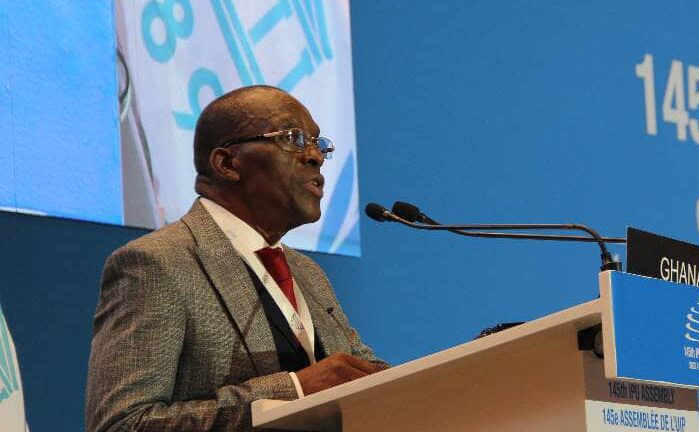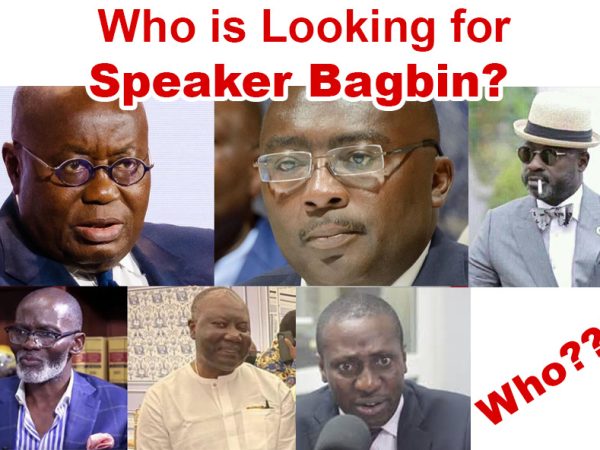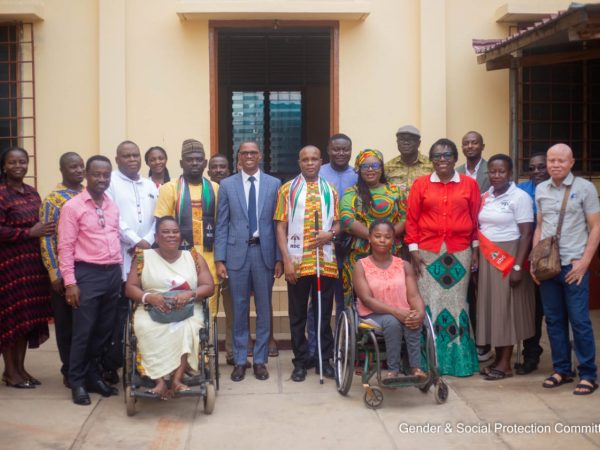Lets Act Collectively on Women and Girls issues- Speaker Bagbin urges World Parliament
THE Speaker of Ghana’s Parliament, Alban Sumana Kingsford Bagbin, has urged Parliaments across the globe to act collectively to ensure that no one, especially women and girls, is left behind in any aspect of their national life.
He said a just and peaceful world would be in sight the day when women and men would enjoy the same rights and opportunities across all sectors of society, including cultural, social, political, and economic participation and decision-making.
“For there can be no peace without justice and the much talked about peace, prosperity and sustainable development will continue to elude the world without gender equality,” he said.
Prioritize women’s interests
Addressing the 145th Inter-Parliamentary Union (IPU) assembly in Kigali Thursday (Oct 13), Mr Bagbin said “Since women constitute the majority of the world’s population, their interest must equally find expression in whatever we do.
“This is a sine qua non to ensuring a more resilient and peaceful world. The reverse produces an antithesis– a polarised, divisive, bitter, poor, unjust, undeveloped, and war-prone world,” he said.
The event, which is being held on the theme “Gender equality and gender-sensitive parliaments as drivers of change for a more resilient and peaceful world,” has attracted over 1,200 delegates, including Speakers and deputy speakers of parliaments, representatives of diplomatic corps, and international observer bodies.
The meeting will facilitate the exchanges on good practices to make parliaments more gender-sensitive as well as encourage parliaments to pledge transformative action.

Equal representation
Mr. Bagbin said given the current demographics of more than 50 per cent of the global population being females, their equal participation in whatever society did was imperative to ensure inclusive and responsive governance.
He said gender equality, when promoted through gender-sensitive parliaments, would be one of the most reliable and effective drivers of change for a more resilient and peaceful world.
“It is against this background that goal five of the Sustainable Development Goals (SDGs) target seeks to ‘ensure women’s full and effective participation and equal opportunities for leadership at all levels of decision making in political, economic and public life,” he said.
In the view of Ghana’s Speaker of Parliament, the legislature is the heart and lifeblood of democracy and good governance.
He said parliaments were the House, in fact, the home, of the people and as such its composition ought to be a true reflection, a mirror of the people it represented.
“This means all the people must be equally represented, heard, and given equal opportunities.
The role of Parliament.
Mr. Bagbin told the assembly that parliament itself could play a significant role in the creation of a gender-sensitive institution.

Through legislation, regulation, and policy adaptation mechanisms parliaments could remove barriers to the full participation of all sections of society, such as women, the youth, the physically challenged, and minorities, he said.
In executing its mandate, a gender-sensitive parliament ought to ensure that policies and legislations were well scrutinised and subjected to gender analysis to include the articulation of the interest of all groups, he added.
“This is to ascertain whether the gendered differentiated outcomes put women, girls, the youth, physically disabled on equal footing with boys and men,” he said.
Case of Ghana
Touting the success story of Ghana in promoting gender equality, Mr. Bagbin said the country had definitely made a conscious effort to support gender equality since 1958.
The Parliament of Ghana, he said, had been working to ensure the realization of that goal.
“The need to be a driver of change through a number of policy measures has therefore not been lost on Ghana’s Parliament.
“The efforts of Ghana towards the emancipation of women and the girl child started from the creation of a desk in the Office of the President to the setting up of a Secretariat and from the creation of National Commission on Women and Development to the establishment of a full-blown Ministry of Gender and Children,” he said.
Among others, Mr. Bagbin spoke about how legislation were made by Ghana’s Parliament to remove social, cultural, and political barriers to gender equality and women empowerment.
Those initiatives found expression in the provisions of the 1992 Constitution and had produced two women Chief Justices in a row and the first lady Speaker, one of my predecessors in Parliament.
“The increase in the number of women in Parliament from that of 30 in the Fifth Parliament of the Fourth Republic out of 275, representing 11 per cent, to 40 women representation in the Eighth Parliament, representing about 14.5 per cent of the 275-member Parliament.
Pull quote
“For there can be no peace without justice and the much talked about peace, prosperity and sustainable development will continue to elude the world without gender equality.”

Source: Konana Agyeman/Kigali








